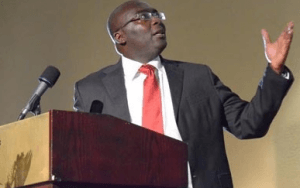
Vice Presidential Candidate of the New Patriotic Party (NPP), Dr Mahamudu Bawumia says government has not prioritized the energy crisis at all and has not allocated enough from its borrowing to power generation.
Dr Bawumia who presented a compilation of the promises made by the Mahama-led government and their past deadlines during a press conference on December 2, 2015, said the president’s recent remark in Tamale that “dumsor” should not be used for politics, showed that the power crisis was more a political issue to government than an economic one.
“After promising to resign if dumsor is not over by the end of the year, the Minister of Power now says he was talking about load shedding and not dumsor. We are still trying to understand what he means,” he said.
Dr Bawumia said government’s debt of GH¢1 billion to the Volta River Authority was making it difficult to maximize use of total installed capacity, adding that the 10-year Karpower barge deal, “does not make sense” as the money for the barge, which will sail away later, could have been used for permanent plants.
Basing his argument on estimates of the Africa Centre for Energy Policy (ACEP), he said the capacity charge of 5.6 cents per kilowatt hour, translates into a cost of about $1 billion for 10 years, even excluding the cost of 35,000 tonnes of fuel per month.
“After 10 years the barge will sail away, when we could have built a 1,000 megawatt plant for ourselves. Power from the barge would also cost at least twice that supplied currently from Takoradi”, he said.
The party took a swipe at government for what it described as mismanagement of the economy and said the 2016 budget was no different from others before it, after two terms in office during which no major gains had been made. Instead, they noted, Ghana was rather experiencing declining growth in agriculture, rising cost of living, unemployment, exchange rate depreciation, power crisis and other challenges.
Dr Bawumia said while the economy grew under the NPP’s tenure with steady growth rates by 500 per cent from $5.1 billion to $28.5 billion even without crude oil, the NDC has managed only a 52 per cent increase from $28.5 billion to a projected $39.4 billion in 2016.
On the cocoa industry, Dr Bawumia said the National Democratic Congress’s management of the industry had been “nothing short of a disaster” and since reaching the one million metric-tonne mark in 2010 in the wake of the NPP’s policies and projects, current production had fallen to less than 700,000 metric tonnes.
Dr Bawumia also accused the NDC of mismanaging a total of GH¢200 billion that it had made from taxes, oil revenue and loans, adding that despite the resources, there were arrears with payments to the NHIS, GETFund, District Assemblies Common Fund, payments to contractors, NADMO staff and so on, and government has also cancelled teacher and nursing trainee allowances.
“The government has also, not withstanding all these resources, put Ghana in a state of high indebtedness and Ghana is today being classified as a country with high risk of debt distress”.
Dr Bawumia said 90 per cent of Ghana’s debt since independence had been accumulated by the NDC in the last seven years.
In addition to the high debt, he said the high interest rates were stifling the private sector.
The opposition NPP said it will soon present its “alternative vision” for Ghana, as the country heads to the polls in 2016.
By Emmanuel Odonkor
